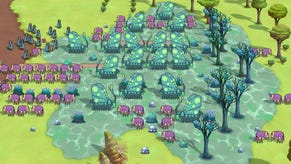Letters Of Love: Galatea
This week will be punctuated by some guest-posts from writer chums of RPS. The first of these is by Lewis Denby, and is about Galatea by Emily Short.
I'm writing this with a tear in my eye.
I don't cry at games, really. I've been close a couple of times before - Dear Esther's conclusion was particularly heartbreaking, and Braid's general solemness made it somewhat emotionally draining - but I've just played through Galatea for probably the twentieth time, and it's still so marvellous, so perfect and so tragic that I find it impossible to remain unmoved.
Still totally caught up in the moment, but honestly? Nothing's this good in videogames. Nothing.
Galatea's an expressive, forward-thinking work of interactive fiction (IF) by Emily Short. The setup? You're an art critic, standing in a room, observing a statue. The whole experience takes place in a fixed position, as you interrogate this magical, talking piece of sculpted rock for your report. If you know anything about IF, you probably know that already. But there'll be a huge abundance of people playing games who remain uninitiated. And, from what I can tell, there's a huge abundance of mainstream developers who fall into the same category.
Let's talk about narrative in games. What springs to mind when thinking about the finest examples of storytelling within the medium? Half-Life? Planescape, maybe? Probably BioShock for the younger generation. When Resolution colleague Christos Reid appeared on the Big Red Potion podcast, and was asked what he considered to be gaming narrative's crowning achievement, he said Super Mario Bros. Crispy Gamer's Kyle Orland, on the same show, said Space Invaders.
This is the thing. We're often guilty of looking at it from the wrong angle. All the cinematics in the world, all the fabulous cut-scenes, high-budget voice acting, huge, expansive, conspiracy laden plots - they're all getting tiresome, and not evolving the videogame in any meaningful way. Quizzed about their choices by a clearly bemused pair of podcast hosts, Reid and Orland both agreed: the strength of the videogame is not in telling complex, confusing stories. It's in showing simple ones.
The depth and detail of Galatea are far from straightforward, but it still strikes me as a logical step for the discussion to take. Space Invaders, Orland argued, is superb because everything you need to know is laid out in front of you. Even by hearing the name, you've a pretty good idea of what it entails. Once you get to the in-game screen, with you at the bottom and the eponymous foes dropping in from above, you've a full understanding of what's going on. The Earth is being attacked. You have to prevent it from happening.
In other words, it's the old adage of showing, not telling. The result is a game you understand simply by playing it. And, through a very different set of methods, Galatea does exactly the same thing. Most obviously, it's entirely text-based. But none of this text ever tells you what your job is, and rarely is Galatea's emotional turmoil laid out in front of you. It's all encoded sweetly into the subtext of what's going on. When you touch Galatea's marble skin, she flinches. By simply interacting in a logical manner, you learn more about this character than any cut-scene or info-dump could ever hope to convey.
What's interesting is how Galatea strikes a masterful balance between intricacy and simplicity. Told as a linear sequence of events, the story of how Galatea came to be in this room is as basic as they come. It's worth noting that this, the actual plot bit of the plot, is the only thing Galatea hands to you on a plate. She explains it all in an answer to one, possibly two questions. More fascinating is how the complexities of the character design - not just that of Galatea, but of peripheral characters we never meet - are presented. These are the incidental glances, the candid nuances of her dialogue, even a short pause before an answer. They all add up to create, out of what should have been an inanimate object, one of the most plausible, human characters we're ever likely to meet in a game.
If Galatea can achieve this through pure text, it's a mystery as to why those with the access to flashy audiovisual techniques aren't attempting something similar. Obviously, an entire game set in a single room is unlikely to top the sales charts any time soon, but I'm yet to see even an isolated sequence in a supposedly mature role-playing game even approach the level of narrative mastery displayed in Galatea.
And in terms of approaching something akin to an art game... well, Galatea transcends that. There's nothing particularly showy or artful about its presentation. Indeed, it's basically straightforward literature. Heck, literature's a pretty big word to use in connection with a computer game, but it's the modesty of Galatea's approach that allows the real ingenuity to stand out here. It's not an art game; it's /a game about art/. And through merely simulating a viewing of this fascinating creation, the art embedded within the game's content pierces through the surface. It's a brave approach to take, but one that proves remarkably effective.
That alone would have garnered a sniffle, especially considering how deeply upsetting Galatea's story turns out to be. Her personification was an unhappy one, and the existence thrust upon her as tragic as they come. But the tear came from somewhere else. The tear's personal.
Because as fascinating, courageous and beautiful a creation as Galatea is, she's not what resonates with me the most. That award goes to the player's character, the critic, as he embarks on a subtle journey of discovery without ever leaving the room.
From this perspective, it's all about growing up and learning to understand what's alien. It's about dropping pretenses, egos and prejudices. It's about realising the value of others' creations, and never losing sight of your own role relating to them. It's about learning to accept criticism, even as a critic. It's about becoming more measured, but also understanding that wearing your heart on your sleeve is okay. It is, in essence, the same journey I'm having to embark on, as I take my first steps into this scary world of writing about videogames.
I started doing this on a hobbyist basis as a precocious teenager in the early 2000s. I matured, thinking my way into the industry would be to remain stern, formal and enormously critical. But I grew up realising otherwise. My first two articles to catch the eyes of respected editors were, effectively, unashamed love letters to tremendous games. And if you let him, during the mere fifteen-or-so minutes Galatea takes to play, your critic will learn to love a spectacular marble lady with the deepest and warmest of souls.
So in an odd way, though I wasn't really aware at the time, I think Galatea was probably something of a guru to me. For a game to have such a profound effect on your own life, be it personally or professionally, is a wonderful thing - and if I've done it even the slightest speck of justice here, I can sleep soundly tonight. It's a spellbinding piece of moment-capturing character work, one that a lot of people in positions of industry power would do well to pay more attention to. It's a piece of literature that positions Emily Short as some sort of godlike figure in my mind, for absolutely defining the potential of interactive storytelling. It's exquisite and wonderful. It's difficult to stop enthusing.
I will stop. But I'll stop with a shameless plea that those who haven't already played this do so. At worst you'll find it interesting to observe how Short slowly builds the relationship between critic and critiqued, or how subtly a sense of place is conveyed. Better, you'll find it life-affirmingly brilliant, as I did. But if it truly strikes that magical chord, you could find yourself moved beyond any other game around. At best, you could really learn something, and that's just marvelous.
You can read/play Galatea online here. (Type > for the command prompt.)










